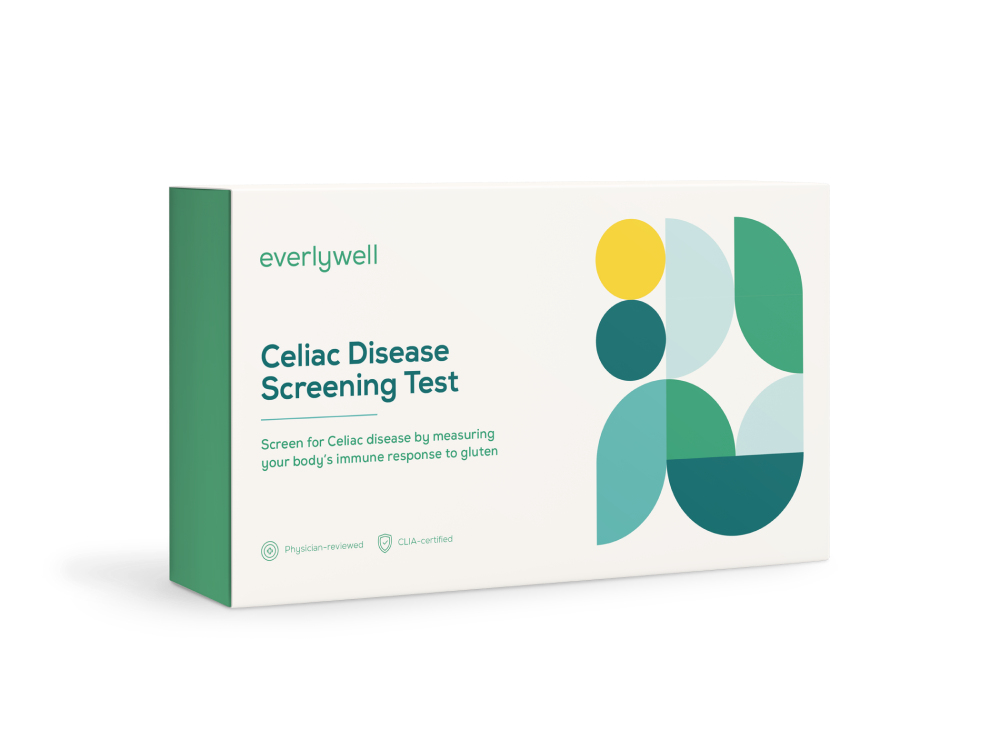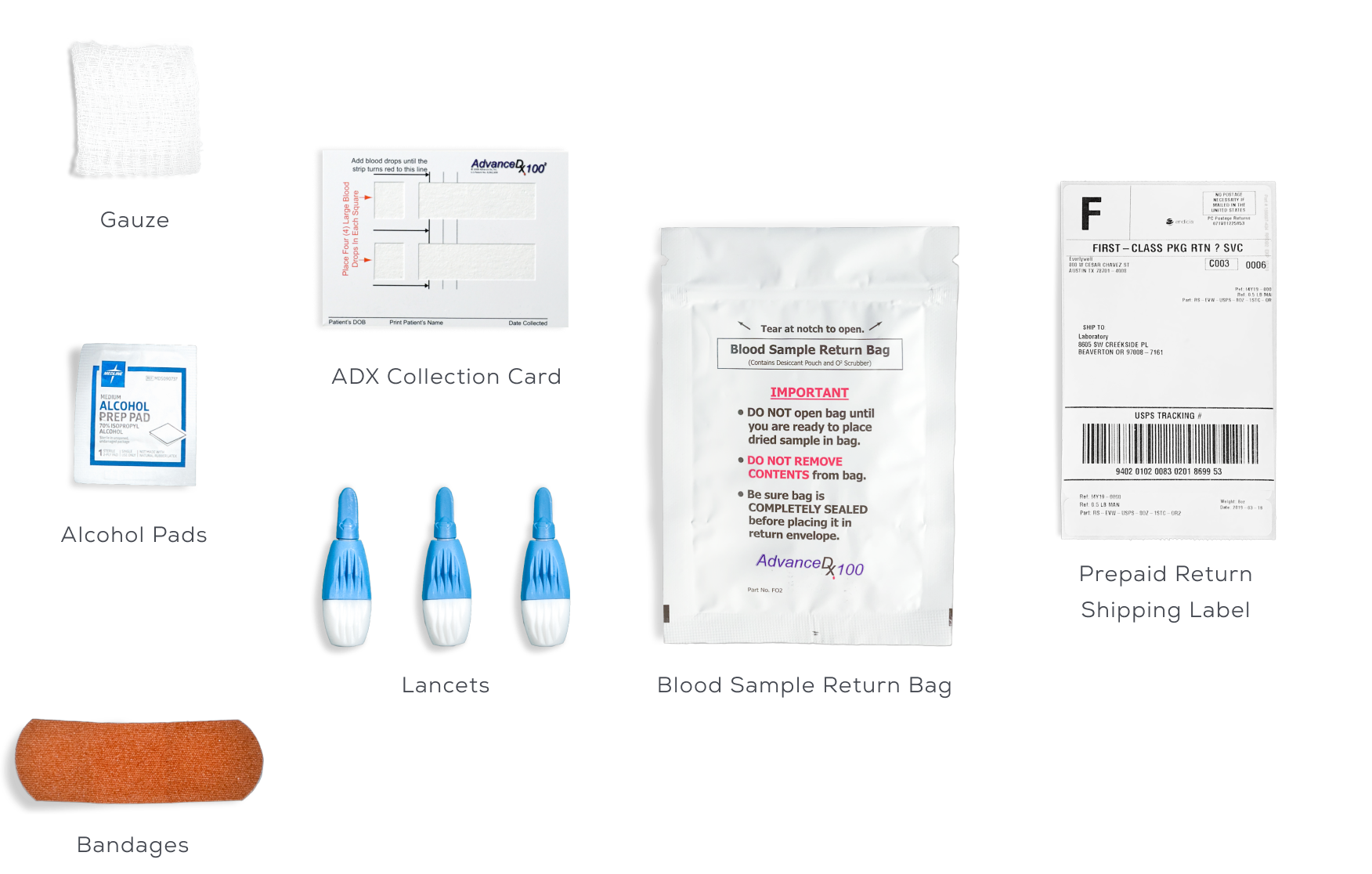








Celiac Disease Screening Test
$119
Free Shipping • FSA / HSA accepted
This at-home lab test checks for antibodies that may indicate celiac disease. If your results show that you may have an increased risk of celiac disease, our patient care team will reach out to you about next steps.
Measures 3 key antibodies that aid in the diagnosis of celiac disease
Finger prick sample collection
Screen for Celiac disease by measuring your body’s immune response to gluten









Celiac Disease Screening Test
This at-home lab test checks for antibodies that may indicate celiac disease. If your results show that you may have an increased risk of celiac disease, our patient care team will reach out to you about next steps.
Measures 3 key antibodies that aid in the diagnosis of celiac disease
Finger prick sample collection
$119
Free Shipping • FSA / HSA accepted
Questions?
- Abdominal pain
- Abdominal bloating
- Constipation or diarrhea
- Excessive gas
- Nausea or vomiting
- Unexpected weight loss
- You have already been diagnosed with celiac disease
- Are not currently eating a gluten-containing diet or have not eaten gluten-containing foods in the last three months. *Note: Talk to your healthcare provider for guidance before adding gluten back into your diet for testing*
- Have a family member with celiac disease
- Have other autoimmune disorders
- Have Type 1 diabetes
While we can’t speak to other tests specifically, we can say that the Celiac Disease Screening Test follows a clinically-accepted testing algorithm that measures tTg-IgA and total IgA, with reflex to DGP-IgG.
The instruments and methods used by our laboratories are similar—and often exactly the same—as those used by a doctor’s office. Our at-home sample collection methods, like dried blood spot and saliva, have been widely used for decades.
- Total immunoglobulin A (IgA, included as a test control
- Tissue transglutaminase immunoglobulin A (tTG-IgA)
- Deamidated gliadin peptide immunoglobulin G (DGP-IgG, included only as needed)
When you have celiac disease and ingest gluten, your immune system may react by releasing the antibodies tTG-IgA and DGP-IgG, which cause inflammation and damage to your small intestine. You may have celiac disease if you have these antibodies along with symptoms.
However, some people may experience similar symptoms to those with celiac disease, despite receiving a negative test result, which could suggest a condition known as non-celiac gluten sensitivity (NCGS). Ultimately, only a healthcare provider or specialist can diagnose celiac disease by reviewing your medical history and symptoms and by performing additional tests if needed.
- The first step includes testing both tTg-IgA and total IgA. (tTg-IgA is the preferred and most sensitive test for possible detection of celiac disease in people with normal total IgA levels.)
- The next step, DGP-IgG testing, is only completed if your tTg-IgA is negative and total IgA is low or could not be determined. DGP-IgG is tested additionally here because those individuals with low total IgA, or an IgA deficiency, will test negative for tTg-IgA. (DGP-IgG is another antibody released by the immune system in someone who may have celiac disease.)
- Lastly, DGP-IgG is completed in this case to help to rule out an IgA deficiency being the cause for low tTg-IgA and help aid in the possible detection of celiac disease in those with low total IgA.
- Food sensitivities are distinctly different from celiac disease. Food sensitivities can cause a wide range of symptoms such as abdominal pain, bloating, indigestion, and headaches or migraines.
- Celiac disease is an autoimmune disorder in which the immune system reacts to gluten. It involves inflammation and damage to your small intestine and prevents your body from getting the nutrients you need from food. Celiac disease can cause both digestive and other bodily symptoms.
A diagnostic test is completed to either diagnose or rule out a specific health condition. The results of diagnostic tests alone provide enough confidence for a healthcare provider to diagnose and make treatment determinations.
A screening test is done to help determine a risk for a specific health condition. The results of screening tests alone cannot be used to confirm or rule out a particular diagnosis. If positive, the results are to be used in combination with symptoms, medical and family history, and additional testing as needed to aid in diagnosing or ruling out a disease.
The Celiac Disease Screening Test checks for antibodies that, when present or elevated, may indicate celiac disease. This is intended to be a first step in the process of determining if you have celiac disease. Positive results are not a diagnosis of celiac disease but may mean you need further evaluation and additional testing, which might include an endoscopy.
- Digestive symptoms: abdominal pain or bloating, diarrhea or constipation, gas, nausea/vomiting, unexpected weight loss
- Non-digestive symptoms: anemia, bone/joint pain, fatigue, headaches, bone loss, peripheral neuropathy
Your results will tell you if you have certain antibodies that may indicate celiac disease. These antibodies include total immunoglobulin A (IgA), tissue transglutaminase immunoglobulin A (tTG-IgA), and deamidated gliadin peptide immunoglobulin G (DGP-IgG, included only as needed).
When you have celiac disease and ingest gluten, your immune system reacts by releasing these antibodies, which cause inflammation and damage your small intestine. You may have celiac disease if you have these antibodies along with symptoms.
Only a healthcare provider or specialist can confirm celiac disease by performing additional tests and reviewing your medical history and symptoms.
A food allergy is what happens when your immune system mistakes a certain food as a threat to your body (this is then called an “allergen”) and produces IgE antibodies as a result. Food allergies have distinct symptoms, such as itching, hives, nausea, vomiting, and difficulty breathing, and can be serious and life-threatening. The Food Allergy Test results will tell you whether you have IgE reactivity to the food allergens tested. The results of this test may be used, along with your medical history and symptoms, by your healthcare provider to help create a plan that’s right for you.
Food sensitivity testing shows IgG antibody reactivity to different foods. IgG and IgE are different types of antibodies. Food sensitivity can cause a wide range of symptoms such as abdominal pain, bloating, indigestion, and headaches or migraines. These symptoms are generally more delayed in nature than food allergy symptoms. Food sensitivity testing is intended to identify foods in your current diet that might be connected to food sensitivity symptoms. The results can help a person prioritize which foods to consider for a two-part elimination diet.
Celiac disease is an autoimmune disorder in which the immune system reacts to gluten. It involves inflammation and damage to your small intestine and prevents your body from getting the nutrients you need from food. Celiac disease can cause both digestive and other bodily symptoms. These symptoms are generally delayed. The Celiac Disease Screening Test measures another type of antibody called tTG-IgA (and DGP-IgG if indicated), and may be a first step in checking your digestive health.
Would you like to order this test?
Shipping Address
,